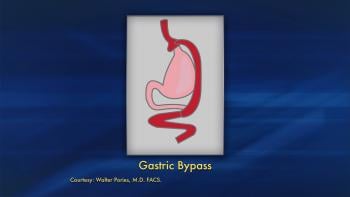Rep. Jesse Jackson Jr.'s past weight-loss surgery may be behind his latest "gastrointestinal issues."
Some weight-loss procedures, like gastric bands, restricts the size of the stomach, limiting how much food one can eat and making patients feel full more quickly. But the most popular weight-loss surgery is the gastric bypass.
 The bypass reduces the size of the stomach by about 90 percent, to about the size of a golf ball. But it also reroutes food so that it passes directly to the small intestine. That changes how the body absorbs food, taking in less fat from the food you eat. Combined with the smaller amounts of food consumed, the surgery can produce significant weight loss. In the illustration to the right, the red pathway is the route food takes in the digestive tract after the surgery.
The bypass reduces the size of the stomach by about 90 percent, to about the size of a golf ball. But it also reroutes food so that it passes directly to the small intestine. That changes how the body absorbs food, taking in less fat from the food you eat. Combined with the smaller amounts of food consumed, the surgery can produce significant weight loss. In the illustration to the right, the red pathway is the route food takes in the digestive tract after the surgery.
 Rep. Jackson's surgery, the duodenal switch, is the rarest weight-loss surgery, accounting for only 1-2 percent of the 200,000 weight-loss surgeries each year.
Rep. Jackson's surgery, the duodenal switch, is the rarest weight-loss surgery, accounting for only 1-2 percent of the 200,000 weight-loss surgeries each year.
The switch also reduces the size of the stomach, though not as severely--a sleeve of golf balls, instead of just one. It also has food avoid most of the small intestine, which cuts down on nutrients absorbed. But that malabsorbtion can have significant drawbacks--the body no longer gets as many vitamins and minerals from the food it digests, so patients are advised to take calcium and multivitamin supplements to avoid long-term problems.








